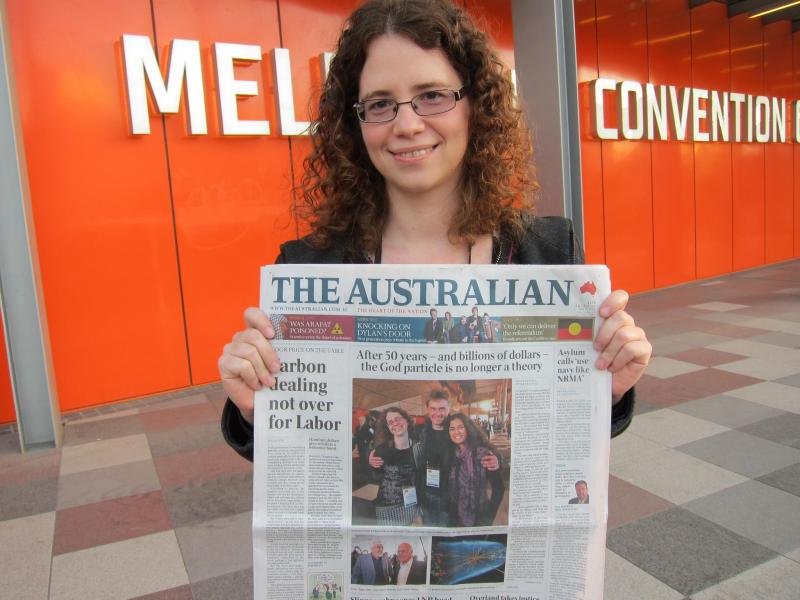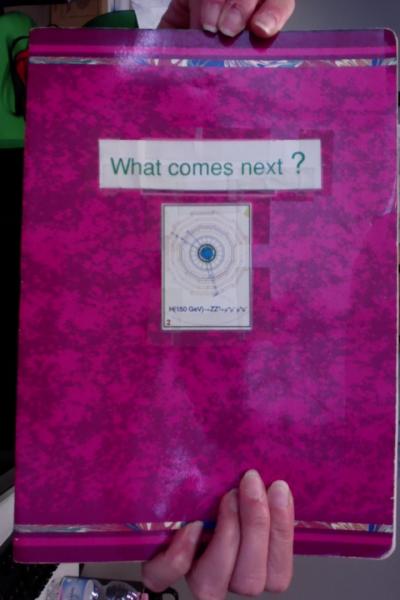Third time lucky
– Gavin Davies, Professor of High Energy Physics at Imperial College London, UK
The day was a whirlwind of excitement and press interviews – starting with the press conference in London for the screening of the official CERN seminar – so at least no queuing for seats, but not quite the same as being there 'live'. I did end up on the TV evening news – all be it very briefly, and on Channel 5 – but the kids were very proud. For me it was third time lucky, having been heavily involved in Higgs searches at both LEP and the Tevatron previously. Thinking about it, it's really quite sobering. It's a testament to human creativity and ingenuity – and our ability to work together on these worldwide projects. I feel honoured and lucky to have been part of this. And scientifically it opens a new window to our Universe.
The unexpected interview
– Anna Kropivnitskaya, CMS physicist from the University of Kansas, USA
I was at ICHEP in Melbourne at the time. While I was waiting for the conference registration with my colleagues Konstantin Toms (ATLAS) and Maria Toms (CMS), a man come to us and started to ask us questions about the Higgs boson and about our opinion on will happen in one hour: will the Higgs discovery be announced? Of course we were hoping to hear good news. Suddenly he asked if he could take a photograph of us. You know what happened later that day: it was one of the most important event in physics! The day after at the conference, our colleagues found our photo in “The Australian” newspaper with our interview and photo on the 1st page. We didn't even knew that it was interview!

My four muons
– Francesca Cavallo, CMS physicist from INFN Bologna, Italy
I had been working on DELPHI until 2001, when I decided to switch to CMS. LEP had brought us so near to the Higgs boson: just a handful of GeV were left in our “climb”, but none could tell us so at the time! So I took a new logbook (a paper logbook!) and I pasted on it the picture of a simulated event display with a Higgs boson decaying to four muons, with the words “What comes next?” – the words referred to both physics and my own life.
On CMS, I got engaged in the construction of the Drift Tubes, the barrel part of our muon detector, and what I had in mind was those four muons. When data arrived, I also worked on the Higgs searches until the four-muon peak emerged. Among the candidate events I picked one with four muons in the Drift Tubes: just like the old simulated one!

A new birth
– Anne-Marie Magnan, CMS physicist at Imperial College London, UK
The day the Higgs was announced, I was home 40 weeks pregnant, looking forward to making my own discovery of the year: motherhood! But I really remember well plugging my computer into a projector and watching the webcast on a big screen, so it would feel more like I was in the main auditorium at CERN with everyone. I felt very proud of all of us for this great achievement.
26 years to complete my task
– Colin Jessop, CMS Physicist from the University of Notre Dame, USA
I began my research career on 4 July 1986 at Harvard University, in the US, with Carlo Rubbia. Professor Rubbia liked to have group meetings on US national holiday. My first project was to look for the decay of a Higgs into two photons in the UA1 experiment’s data. Exactly 26 years later we announced the discovery of the Higgs decaying to two photons, and my group was part of the CMS team doing that analysis. It only took 26 years to the day to complete the project that Professor Rubbia assigned me on my first day.
Have we made a mistake?
– André David, CMS physicist from CERN
After a sleepless month (I worked in the CMS di-photon channel and on the final combination of all CMS Higgs searches), on 4 July 2012 I left CERN around 2am after helping prepare the CMS presentation for the seminar. Then, during the morning, I was in the main auditorium, live tweeting for CMS. Many people ask me when the Higgs boson was discovered, usually thinking that I'll say something about the CMS data. In fact, for me, the discovery happened upon seeing the ATLAS results and realising we hadn't made a mistake ourselves.
360º photo of the auditorium during the Higgs seminar. André David appears in the middle of the second row, with a red shirt. (Image: Max Brice/CERN)
So lucky to be here
– Joona Havukainen, CMS PhD student from Helsinki University, Finland
It was the summer before the beginning of my university studies, and I was working as a summer helper at a factory, building industrial air conditioners. Throughout the day I followed the news coverage of the announcement on my phone, whenever I had a moment to spare, hoping that one day I could at least visit CERN, where they were discovering the secrets of the Universe. Today I still can't believe how lucky I am to get to do research for my PhD here.
Kind but unhelpful
– Ken Bloom, CMS physicist from the University of Nebraska-Lincoln, USA
Where was I when the Higgs discovery was announced? I was attending ICHEP in Australia. For the announcement presentations, I was sitting in the auditorium. Sitting to my left was Joel Butler, who is now the CMS spokesperson. I didn't know the person on my right, so I introduced myself. She turned out to be a reporter for the Australian Associated Press who had been assigned to cover the event. She was a general assignment reporter with no science background, and she was a little worried about what was about to come. I said that I would try to help her out.
The next morning I was Googling around for news about the announcement, and I found this story. This wasn't really how I was planning to make the news. But I will say that the words "kindly" and "unhelpful" appear frequently in my teaching evaluations.
The views expressed in CMS blogs are personal views of the author and do not necessarily represent official views of the CMS collaboration.
